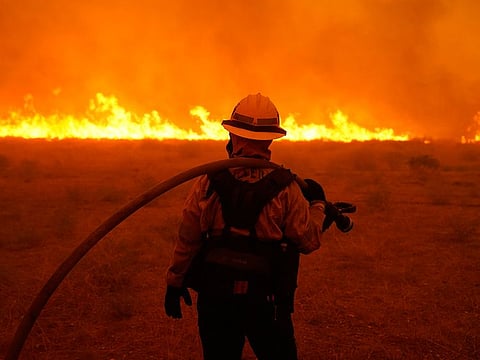Climate change is here. Climate change is now.
Earth is the only home we have. We have nowhere else to go

Readers of Gulf News will recall two very disturbing bits of news last week. One was how forest fires are causing a ‘nuclear winter’ in San Francisco, and the other was almost 70 per cent of the planet’s wildlife having been wiped out in the last five decades.
These events are a stark reminder that despite the little positive impact that the COVID-19 pandemic has had on the environment as a result of human beings staying caged in their homes and factories being shut — cleaner air, blue lagoons, clear skies — the impact of human activity on the environment remains as worrisome as ever. Wildfires, unseasonal rains, floods, unusual dry spells — all these are indicators of peril that Mother Nature is sending us.
Climate change is here. Climate change is now. Action is needed immediately.
“We are seeing the emergence of some signals that would have had almost no chance of happening without human-induced climate change,” Sonia Seneviratne, a climate scientist at Swiss university ETH Zurich, was quoted by Reuters as saying.
Climate change is possibly the biggest challenge humanity is facing in modern times. As the human population explodes, more and more land is being devoured by the incessant march of civilisation — felling trees, cleaning up forest lands, decimating animal species in the process. As the forest cover disappears acre by acre, a proportionate increase is thus seen in global temperatures. Europe, a continent with a mostly temperate climate, has been witnessing its hottest summers in recent years, with several deaths due to heatstroke. The same is true elsewhere in the world as well.
The ‘nuclear winter’ in San Francisco is just a manifestation of this trend. Research by the Centre for Climate and Energy Solutions shows that changes in climate that create warmer, drier conditions, increased drought, and a longer fire season are boosting these increases in wildfire risk. For much of the US West, projections show that an average annual 1 degree Celsius temperature increase would increase the median burnt area per year as much as 600 per cent in some types of forests. In the Southeastern United States, modelling suggests increased fire risk and a longer fire season, with at least a 30 per cent increase from 2011 in the area burnt by lightning-ignited wildfire by 2060.
At least wildfires in California are a known, annual phenomenon. But the relentless juggernaut of climate change has not even spared one of the remotest corners on earth — the Artic permafrost region. A recent report in carbonbrief.org enumerates how from March to July this year, unprecedented heat in the Arctic fanned large ‘zombie fires’ in Siberia. “The fires ripped across vast stretches of permafrost, threatening the release of millions of tonnes of long-held carbon,” Daisy Dunne says in the report.
Let us now turn to deforestation. In 2019, tropical rainforests — whose preservation is considered crucial to curbing climate change — disappeared at a rate of one football pitch every six seconds, according to data from monitoring service Global Forest Watch.
A recent article in National Geographic reported that between 1990 and 2016, the world lost 1.3 million square kilometres of forest, according to the World Bank — an area larger than South Africa. Since humans started cutting down forests, 46 per cent of trees have been felled, according to a 2015 study in the journal Nature. About 17 per cent of the Amazonian rainforest has been destroyed over the past 50 years, and losses recently have been on the rise.
Among other findings, the latest Living Planet Report by the World Wildlife Fund has revealed that the Living Planet Index for the Americas has plunged an astounding 94 per cent. “The conversion of grasslands, savannahs, forests and wetlands, the overexploitation of species, climate change, and the introduction of alien species are key drivers,” the report states. The report highlights that Data from the United Nations Environment Programme shows that, per person, our global stock of natural capital — the planet’s stock of renewable and non-renewable natural resources, like plants, soils and minerals — has declined nearly 40 per cent since the early 1990s, while produced capital (for example, roads) has doubled and human capital (for example, skills) has increased by 13 per cent.
The documentation of the impact of human action on the environment is not new. Almost a century ago, legendary English hunter Jim Corbett wrote about how increasing human foray into forest lands are causing monkeys to invade towns and cities in pre-independence India for food, and relentless hunting of big game for sport will surely decimate the species. His words came true as the tiger had almost vanished till conservation efforts were initiated in the 1970s.
A less talked about but nonetheless critical part of climate change is the economy. While economic growth negatively impacts the climate due to increasing carbon emissions, it also results in severe impact the other way around. As a result of human action, unseasonal dry spells as well as untimely rains and floods are wreaking havoc on agricultural patterns, impacting not only the millions and their families who depend on farming for their livelihood, but also overall food production. This could lead to global food crises if left unchecked.
So what is the way forward? There is no easy answer. While concerted efforts by governments are critical, the initiative has to start with us, literally. We need to change our consumption, our approach to life, to more sustainable patterns.
Caring for the environment cannot remain just part of school projects intended to gain brownie points for entry into prestigious universities. It has to be a lifestyle choice. Without it, there would no life at all.
We must remember that planet Earth is the only home we have. We have nowhere else to go.








